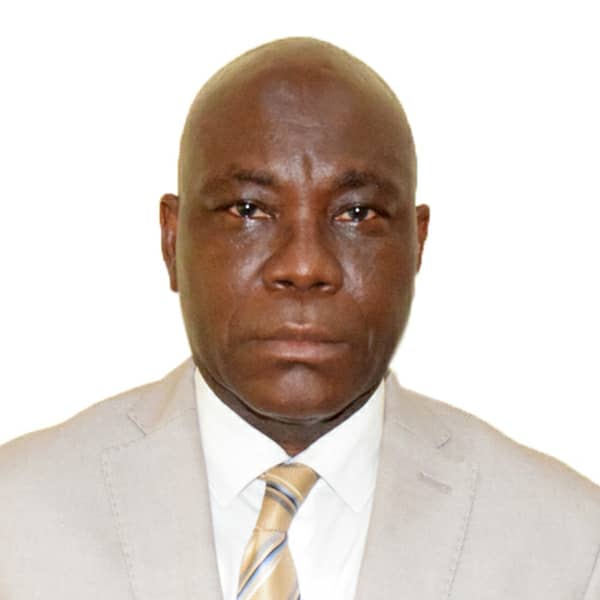CRCC welcomes visiting professor Dr Innocent E. Chiluwa
Professor Chiluwa will be visiting Loughborough University for the next six months and collaborating with members of the Language Social Interaction and Political Communication themes at the CRCC.

Innocent Chiluwa is a Professor in Applied Linguistics (Discourse Studies), Media & Communication. He was the head of the Department of Languages (and later) Dean of the College of Leadership and Development Studies at Covenant University, Nigeria. He is a visiting Scholar at the Department of Languages and Intercultural Studies, Heriot-Watt University, Edinburgh. He is a Georg Forster Senior Fellow of the Alexander von Humboldt Foundation (AvH) and was a Humboldt scholar and visiting professor at the Department of English, University of Freiburg in Germany. He has published books and edited volumes in media studies, social media and society, discourse and conflict studies and deception studies. He has also published extensively in reputable peer-reviewed journals and contributed several chapters in books and encyclopaedias. He is on the Editorial Boards of Discourse & Society (SAGE), Journal of Multicultural Discourses (Routledge), Journal of International and Intercultural Communication (Taylor & Francis) and Humanities and Social Sciences Communications (Springer Nature).
A few words about his research from Dr Chiluwa:
‘My research in the last 5 years has focused on the investigation and analyses of political and conflict discourses in the media and Internet – especially discourses produced by social movements, minority groups, civil societies, rebel groups and terrorist organizations in the form of resistance, protests, activism or dissent and their wider implications for peace and security. Discourses that show evidence of linguistic violence, language aggression and hate speech have been of special interest to me.
In 2022, I received funding from the Centre for Advanced Internet Studies (CAIS, Bochum), to investigate the impact of digitisation on online equality campaigns of women’s rights groups in Africa (Nigeria and Ghana) and Europe (Germany and Norway). Part of the results of that study has just been published in New Media & Society: https://doi.org/10.1177/14614448231220919
The current study entitled: “Social media activism and women’s rights advocacy for political participation in Africa and the United Kingdom” is a continuation of the CAIS study and will examine online campaign discourse structures on women’s political empowerment in other Commonwealth African countries like Kenya, Tanzania, Botswana and Uganda, and compare them with those of their counterparts in the England, Scotland, Wales and Northern Ireland. My choice of these countries is basically based on online visibility of the groups under study. Specifically this study will examine the character of modern women’s rights advocacy groups (WRAG) in the light of conflict theory and new social movement theories; compare digital campaign approaches, including social media platforms mostly used by WRAG in Africa and the U.K.; analyse the discourse structures of campaign discourses (i.e., discourse analysis of online campaign discourses). Is there a resistance to the British colonial legacy on women’s political empowerment in Africa? The study will also examine the impact of new media technology on gender campaigns and interrogate whether there are lessons from the U.K. women’s groups in the light of greater achievement of British women in modern U.K. legislative governments.
I hope to obtain data from the social media accounts of the WRGs under study covering the period between 2019 and 2023. This time covers the period of main national elections in the countries. This study will contribute to our understanding of the impact of social media on women’s rights campaigns in Africa and the U.K. as well as highlight methods in qualitative discourse analysis of the social media campaign data. Hopefully, the research outcomes will be of interest to graduate students, scholars and practitioners in linguistics, media and communication, sociology and social Psychology.’
Please see below for Dr Chiluwa’s recent publications:
Chiluwa, I. (2024). Discourse, digitisation and women’s rights groups in Nigeria and Ghana: online campaigns for political inclusion and against violence on women and girls. New Media & Society (SAGE).https://doi.org/10.1177/14614448231220919
Chiluwa, I. & Ononye, C. (2024). The #PantamiMustGo political activism: a textual analysis of narrative agency in protest discourse. Discourse Studies 26 (2) https://doi.org/10.1177/14614456231221076
Chiluwa, I. (2023). #EndSARS protests and the search for social justice in Nigeria: Examining activist discourses on police brutality, politics and human security. Protest 3(2), 200-224 (Brill).https://brill.com/view/journals/prot/3/2/article-p200_003.xml
Awopetu, I. & Chiluwa, I. (2023). Resistance in visual narratives: A multimodal CDA of images of the #EndSARS protests in Nigeria. Visual Communication Quarterly 30(3), 157-169 (Taylor & Francis). https://doi.org/10.1080/15551393.2023.2232296
Ononye, C., & Chiluwa, I. (2023). ‘There’s still something positive about the Niger Delta ecology’: Metaphor and ideology in the Niger Delta poetic discourse. Language and Literature, 32(3), 275-296. (SAGE). https://doi.org/10.1177/09639470231158694
Aminu, P. & Chiluwa, I. (2023). Reinventing identity and resistance ideology in protest narratives: The case of Oduduwa secessionist group on Facebook. Journal of Language Aggression and Conflict 11(2), 200-225 (John Benjamins). https://doi.org/10.1075/jlac.00078.ami
Chiluwa, I. (ed). (2022) Discourse, Media and Conflict: Examining war and resolution in the news. Cambridge: Cambridge University Press.
Chiluwa, I. & Chiluwa, I. M. (2022) ‘Deadlier than Boko Haram’: Representations of the herder-farmer conflict in the local and foreign press Media, War & Conflict 15(1), 3-24 (SAGE). (First published online in 2020)
Chiluwa, I. (2022) Women’s online advocacy campaigns for political participation in Nigeria and Ghana. Critical Discourse Studies, 19(5), 465-484. (Taylor & Francis). DOI: 10.1080/17405904.2021.1999287
Chiluwa, I. (ed). (2021) Discourse and Conflict: Analysing text and talk of conflict, hate and peacebuilding. London: Palgrave Macmillan.
Chiluwa, I. (2021) Resisting corruption in the Nigerian legislature: A critical discourse analysis of news and opinion articles on legislators’ salaries. Discourse & Communication 15(5), 519-541 (SAGE).